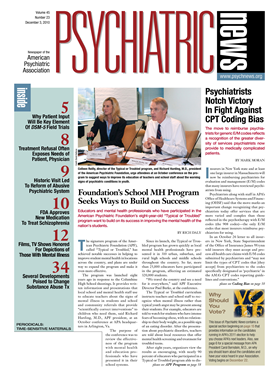William Carpenter, M.D., director of the Maryland Psychiatric Research Center, was a member of a four-person team that in 1989 interviewed individuals who had recently been released from Soviet hospitals after being diagnosed with schizophrenia or other major mental illnesses.
“We didn't think any of them had schizophrenia or a psychotic illness, though there were some we thought did have more minor symptoms,” he recalled. “The one I remember best was an impressive man in his 50s, very robust, who talked freely and assertively. My impression was that he had had a lot of trouble with the government related to political activities. He had suffered from incarceration and was tortured with neuroleptic drugs, which can cause severe dysphoria in non-psychotic individuals. And he may have been one of the individuals who had been given sulfazine injections.
“It was possible to think he might have a bit of hypomania or grandiosity,” Carpenter said. “On the other hand, he might have been someone who could have had a career as a charismatic political leader.”
Carpenter's recollections underscore the issue of “hyperdiagnosis”—the stretching of diagnostic categories to include a range of normal behaviors—that was highlighted by the American delegation as a pervasive problem in the Soviet psychiatric system.
The comprehensive report published in the wake of the 1989 visit noted that hyperdiagnosis was most evident in the large number of detainees diagnosed with schizophrenia or “sluggish schizophrenia,” but was also apparent in other diagnostic areas. According to the report, “Specific examples of psychopathy identified in the interviews included ‘unitary activity,’ which related to a high level of commitment to a single cause such as political reform, and ‘failure to adapt to society,’ used in describing a patient with ‘inability to live in society without being subjected to arrest for his behavior.’”
Carpenter recalled dissident Ukrainian psychiatrist Semyon Gluzman, M.D., who explained that the relatively poor training received by Soviet psychiatrists meant that diagnoses rendered by the psychiatric establishment in Moscow would stand little chance of being challenged by psychiatrists outside of Moscow. “If a patient came to a hospital having been diagnosed with sluggish schizophrenia, there was no one with the capacity to question it,” Carpenter said.
Consequently, many psychiatrists may have known that they were “treating” political dissidents, but the authoritarian system allowed no challenge to the establishment.
Carpenter added that in a repressive culture, even a more rigorously scientific diagnostic system was vulnerable to manipulation. “I for one would argue that [the Soviets] didn't need [the diagnosis of sluggish schizophrenia] to label dissidents as mentally ill,” he told
Psychiatric News. “They could have used any diagnostic manual, including
DSM. No diagnostic system will stand in the way of a willful application of a diagnosis for political purposes.”

